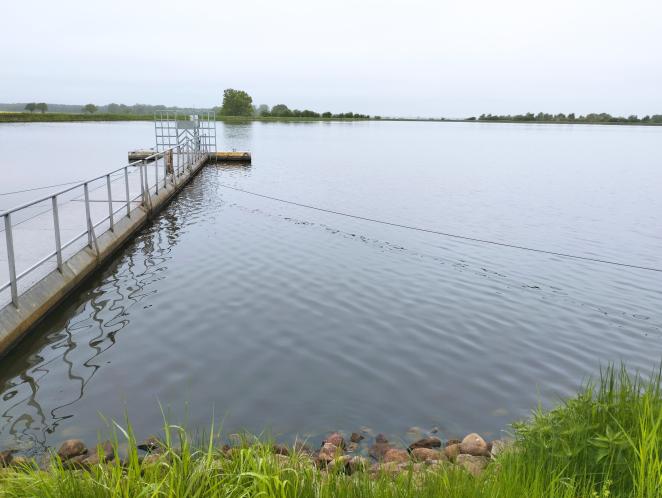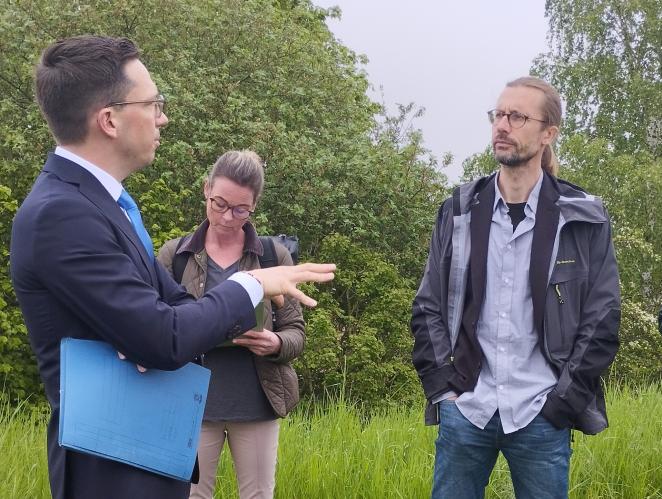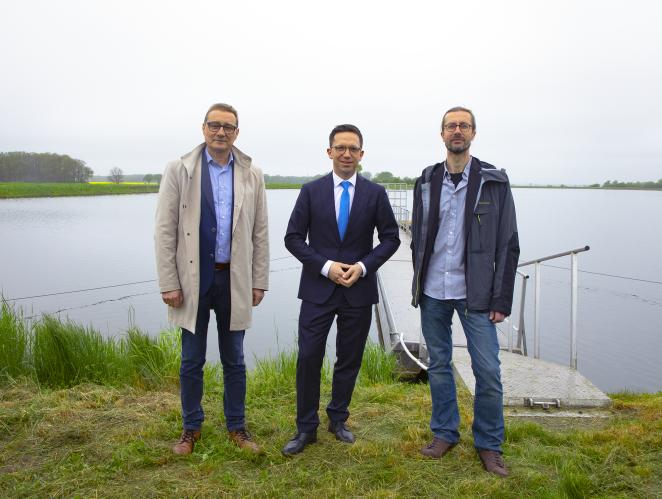In the WaterFarmers pilot, the umbrella organisation for field irrigation in Uelzen, Dachverband Feldberegnung Uelzen (DFU), is developing solutions to secure groundwater resources, while at the same time satisfying the increasing irrigation demand for agriculture, and putting it into practice. The pilot areas in Uelzen can serve as models for other districts. Lower Saxony's Minister of Science and Culture, Falko Mohrs, visited the project area.
WaterFarmers in Uelzen, a beacon for safe irrigation

One of the storage bassins in Uelzen
There are four pilot areas in Lower Saxony and Bremen. One partner in the project is DFU, which is developing and putting into practice targeted solutions for sustainable and safe groundwater management, despite persistent droughts and field irrigation. One example of an existing solution to reduce groundwater extraction is the use of water from the Stöcken water reservoir. Cooperation with Nordzucker AG, which uses water solely from the processed sugar beets from the Uelzen sugar factory during the campaign, ensures climate-adaptive water management for agricultural field irrigation of around 5,000 hectares. "Every year, around 1.4 million cubic metres of groundwater is replaced by water from the three storage basins," explains Jörg Martens.
"Uelzen is the only region nationwide to use storage water and can serve as a model for other districts."
.
Further innovative solutions planned
Further solutions are now being developed within the framework of Blue Transition. These build, to some extent, on the TOPSOIL project completed in 2021, in which a "triple monitoring" approach was developed. Together with the monitoring data and detailed knowledge of the subsurface, the impact of specific groundwater extraction on small streams will be identified, enabling targeted and sustainable management of groundwater resources.
Together with the farmers, the DFU would like to develop a cooperative groundwater-extraction management scheme over the next two and a half years. To this end, the first step will be to use the groundwater flow model developed by the DFU to identify the regions and wells where groundwater withdrawals have a direct negative impact on so-called groundwater-dependent terrestrial ecosystems. In the next step, solutions for water supply for field irrigation are to be sought together with farmers. In addition to relocating groundwater withdrawal to unproblematic areas with new wells and appropriate supply lines, curative measures at water bodies and biotopes, or the use of groundwater substitutes, are possible solutions. In addition, it is planned to dam ditches over the winter, so water can slowly seep away, or to divert water from drainage systems into seepage basins.
Politicians walk through the area
The WaterFarmers pilot area also met with great interest from politicians. In May 2023, Lower Saxony's Minister of Science and Culture, Falko Mohrs, and the State Commissioner of the Office for Regional Development Leine-Weser, Frauke Patzke, among others, visited the area.

"In times of climate change, the issue of water supply is becoming increasingly important for all of us, regardless of which region we live in. This makes projects for sustainable groundwater management more important for us. WaterFarmers is an excellent example of how partners from different disciplines across national borders are working together to develop sustainable solutions that give us and future generations secure access to water as a resource. I am particularly pleased that Lower Saxony is playing a major role in this important goal by researching and implementing practical solutions.”

Left to right:Jörg Martens, Lower Saxony's Minister of Science and Culture, Falko Mohrs and Mike Müller-Petke
Mike Müller-Petke, who coordinates the Blue Transition project and groundwater research at LIAG sees the interdisciplinary and transnational cooperation in Blue Transition as crucial and purposeful to ensure sustainable management of the North Sea region.
"Practical solutions will be found in the pilot areas. These aim at the management of agricultural land in the coastal area, the conservation and rewetting of peatlands, and urban water management."
For this purpose, however, it is always important to record more precisely the subsurface structure as well as the processes over a larger area with the help of geophysics, including the use of drones.
Project partners and areas in Germany
In Germany, the following pilot projects involve various organizations, in addition to LIAG (Federal Institute for Geosciences and Natural Resources):
Luneplate in Southern Bremerhaven, led by the Geological Service for Bremen (GDfB): This project focuses on the management of water resources in an industrial park to prevent the intrusion of saltwater.
Gnarrenburg Moor and Bederkesa Geest Area, led by the State Office for Mining, Energy and Geology (LBEG): The objective of this project is to investigate the impact of artificial groundwater recharge and the rewetting of peatlands on groundwater as a valuable resource.
Ecological agriculture in Northwest Germany, led by the Oldenburgisch-Ostfriesische Wasserverband (OOWV): This initiative aims to enhance soil quality and humus content through the implementation of ecological farm management practices.
Groundwater supply in the district of Uelzen, led by the Uelzen Field Irrigation Association: The focus of this project is to develop a climate-adapted water management system for field irrigation, ensuring a sustainable supply of groundwater in the Uelzen district.
These projects involve collaboration between various organizations, including the Dachverband Feldberegnung Uelzen, the Landwirtschaftskammer Niedersachsen, the Geological Service for Bremen at the University of Bremen, and the Bundesanstalt für Geowissenschaften und Rohstoffe.
Source: LIAG
